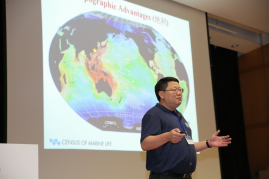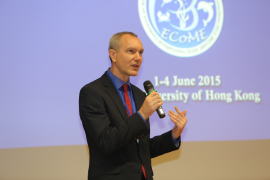Media
Conserving Global Marine Biodiversity in a Changing World:
HKU hosts ‘International Conference on Biodiversity, Ecology and Conservation of Marine Ecosystems (BECoME 2015)’
01 Jun 2015
Over 280 delegates from 26 different countries have participated in the International Conference on Biodiversity, Ecology and Conservation of Marine Ecosystems (BECoME 2015), held from June 1 to 4 at the University of Hong Kong (HKU). The conference was jointly organised by the Swire Institute of Marine Science (SWIMS) and School of Biological Sciences, HKU Faculty of Science. At the conference, participants share their views and discuss the latest scientific discoveries in biodiversity, ecology, and conservation of marine ecosystems worldwide, and explore ways to better conserve our marine biodiversity and fisheries resources.
Hong Kong’s marine biodiversity – still rich – but for how long?
Lying within the worlds hotspot for marine biodiversity, and with its unique geology and hydrography, Hong Kong boasts a great diversity of marine habitats ranging from mudflats and mangroves, to sandy bays and rocky reefs which support a rich marine biodiversity, comprising ~6,000 identified species from more than 34 phyla. More species remain to be identified, and the biology and ecology of many of the identified marine species remains largely unknown, while some are protected, endemic or rare species meriting conservation status.
Hong Kong’s marine environment is heavily utilized for a variety of, often conflicting, services; such as shipping routes; commercial ports and recreational marinas; provision of seawater for cooling and toilet flushing; disposal of wastewater discharge; fishing grounds and recreational uses. These anthropogenic demands strongly conflict with the need to conserve local marine biodiversity, in terms of species but importantly local habitats including the need to increase marine protected areas (MPAs) and, notably, conserve the habitat of the Chinese white dolphin. These conflicts are escalating, with the ever-increasing local human population, and demands for land to build housing and associated infrastructure. As a result, Hong Kong society is debating whether we should sacrifice ~ 650 hectares of natural marine habitat for the third runway at our airport; convert the natural shore at Lung Mei, Tai Po into an artificial beach; and even develop the area around the Hoi Hai Wan Marine Park as a residential zone. These conflicts between coastal development and marine conservation are not unique to Hong Kong, but also commonly occur in most coastal cities around the world.
Hong Kong marine scientists unite to protect our marine environment
To share experiences and seek potential solutions about how we can conserve marine biodiversity while balancing development and conservation, a team of over 25 local marine scientists conjointly established the Joint University Consortium for Biodiversity, Ecology and Conservation of Marine Ecosystems (BECoME) in January 2013. Members of BECoME have already contributed to Hong Kong’s Biodiversity Strategy and Action Plan (BSAP) as part of the Hong Kong Special Administrative Region (HK SAR) Government’s response to the international Convention on Biological Diversity. The BECoME team has recently been awarded a HK$4.3 million Environment and Conservation Fund to study the marine biodiversity and ecology of Tolo Harbour and Channel. Through this project, the team will establish a comprehensive species database of the area, and develop standards for future ecological surveys in coastal habitats to ensure the quality of marine ecological surveys as stipulated by the Environmental Impact Assessment Ordinance (EIAO).
Sharing with the world: the BECoME 2015 conference
Given the implementation of Hong Kong’s BSAP and proposed establishment of more marine protected areas by our Government, this BECoME 2015 Conference is very timely, and brings together international and local experts to share their views and help develop effective responses to protect marine biodiversity, in Hong Kong, the South China region, and indeed globally.
With the generous financial support from the Environment and Conservation Fund of the Hong Kong SAR Government and The Croucher Foundation, 22 renowned marine scientists from overseas and Mainland China will share their knowledge, experience and the latest developments in their respective fields with participants from academia, government, and the private sector at the BECoME 2015 Conference.
Conference themes cover a wide range of topics, including environmental education; human and climate change impacts; ecosystem functions; evolution and biogeography; biodiversity data sharing and management; regional and global biodiversity patterns; strategies for biodiversity conservation; and fisheries and marine resources management.
Importantly the BECoME conference also incorporates a series of Breakout sessions where international and local participants will discuss key issues; from ways to mitigate the impacts of climate change; global projects to assess and protect biodiversity; the sharing of data and its effective management and effective environmental education. These sessions will end with the development of a proposed series of recommendations and goals to help manage and conserve Hong Kong’s marine biodiversity in the future.
For detailed programme rundown, please visit:
http://www.biosch.hku.hk/become/files/conference_booklet_all_28May_1.pdf.
Further information of the conference can be obtained from: http://www.biosch.hku.hk/become/index.html
For press enquiry, please contact:
Ms Esther Liu, School of Biological Sciences (Tel: 2299 0803/ email: epyliu@hku.hk)
Mr Benjamin Miu, Faculty of Science (Tel: 3917 4948/ email: benmiu@hku.hk)





